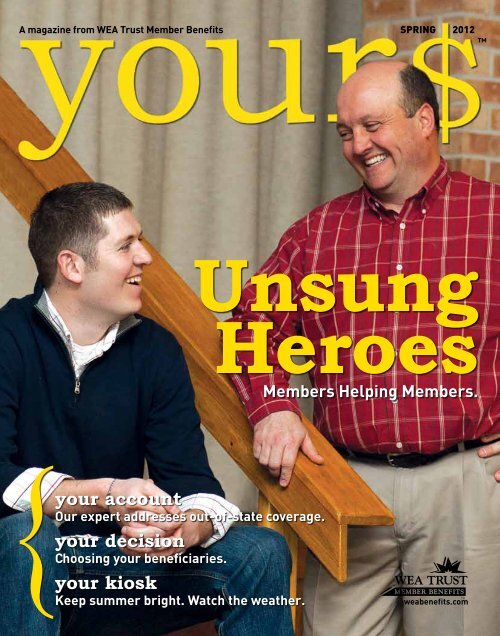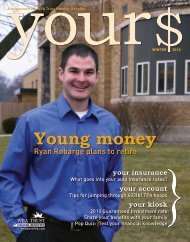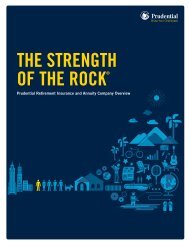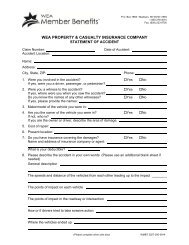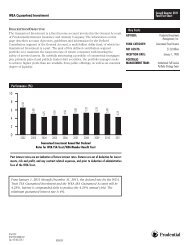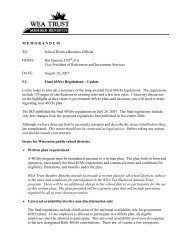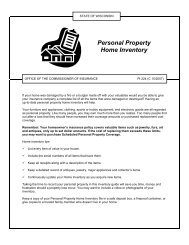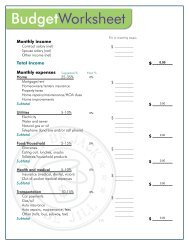View PDF - WEA Trust Member Benefits
View PDF - WEA Trust Member Benefits
View PDF - WEA Trust Member Benefits
You also want an ePaper? Increase the reach of your titles
YUMPU automatically turns print PDFs into web optimized ePapers that Google loves.
A magazine from <strong>WEA</strong> <strong>Trust</strong> <strong>Member</strong> <strong>Benefits</strong><br />
SPRING 2012<br />
<br />
Unsung<br />
Heroes<br />
<strong>Member</strong>s Helping <strong>Member</strong>s.<br />
}<br />
your account<br />
Our expert addresses out-of-state coverage.<br />
your decision<br />
Choosing your beneficiaries.<br />
your kiosk<br />
Keep summer bright. Watch the weather.<br />
TM<br />
weabenefits.com
{<br />
your$<br />
contents SPRING 2012<br />
<br />
3 YOUR ACCOUNT<br />
- Avoid inactive account fees.<br />
- Moving to cell phone only?<br />
- Learn about coverage for<br />
out-of-state situations.<br />
4 YOUR RESOURCE<br />
- Financial mentors help colleagues<br />
get on the road to financial<br />
security.<br />
6 YOUR DECISION<br />
- Who will inherit your retirement<br />
accounts? A guide to choosing<br />
beneficiaries.<br />
6<br />
8 YOUR MISSION<br />
- Mission Possible: Summer<br />
seminars coming your way.<br />
10 YOUR KIOSK<br />
- Reduce loss: Watch the weather<br />
- Give savings a boost with the<br />
payroll tax cut.<br />
- We’ve been nominated!<br />
president’s letter<br />
{Dave Kijek, President/CEO, <strong>WEA</strong> <strong>Trust</strong> <strong>Member</strong> <strong>Benefits</strong><br />
10<br />
4<br />
© 2011 <strong>WEA</strong> <strong>Member</strong> Benefit <strong>Trust</strong>.<br />
All Rights Reserved.<br />
How will you celebrate National Financial Literacy Month?<br />
April was officially<br />
designated National<br />
Financial Literacy<br />
Month in 2004 in<br />
an effort to highlight<br />
the importance of<br />
financial literacy<br />
and teach Americans<br />
how to establish and<br />
maintain healthy<br />
financial habits.<br />
At <strong>Member</strong> <strong>Benefits</strong>, financial<br />
literacy is something we focus on all<br />
year round. Helping Wisconsin public<br />
school employees learn and implement<br />
ways to build their financial security<br />
is fundamental to the mission of our<br />
organization and our staff is passionate<br />
about it.<br />
Our passion is shared by the six<br />
financial mentors highlighted in this<br />
issue. They represent a contingent of<br />
education professionals who have made<br />
it their personal mission to help their<br />
colleagues succeed in the classroom and<br />
financially. Chances are there’s a financial<br />
mentor down the hall from you.<br />
Speaking of missions—check out the<br />
“Mission Possible” summer seminar<br />
promotion on page eight. These<br />
seminars are a great way to increase your<br />
knowledge about important financial<br />
issues. Or, pass the invitation along to a<br />
colleague who might benefit.<br />
Finally, I am thrilled that our Don’t<br />
Be Jack financial learning game has<br />
been nominated for an award from the<br />
Institute for Financial Literacy. We’ll have<br />
to wait until later this month to learn the<br />
results, but just being nominated is quite<br />
an honor.<br />
Thank you for continuing to support<br />
these financial programs created<br />
specifically for you. We are always looking<br />
for ways to improve your experience and<br />
enhance our offerings. Let us know what<br />
we can do for you.<br />
Have a fantastic spring.<br />
2 weabenefits.com
{ your account<br />
IRA and 403(b) News<br />
Avoid inactive account minimum annual fee<br />
There is a minimum annual fee of $25 for an inactive <strong>WEA</strong>C IRA and/or<br />
<strong>WEA</strong> TSA <strong>Trust</strong> 403(b) account with balances less than $5,556 (IRA) or $7,143<br />
(TSA). Inactive accounts are accounts with no contributions or distributions<br />
within a calendar year. You can avoid the fee by making a single contribution<br />
or by taking a distribution (if eligible) at any time during the calendar year.<br />
Also consolidating other accounts into your <strong>WEA</strong>C IRA and/or <strong>WEA</strong> TSA <strong>Trust</strong><br />
403(b) account could help reduce the amount of fees you are paying. Give us<br />
a call at 1-800-279-4030 to review your account.<br />
Did you change where you bank?<br />
Make sure your electronic contributions to your <strong>WEA</strong>C IRA and/or personal<br />
insurance continue without interruption by notifying us if you have changed<br />
where you bank or if your account information has changed.<br />
IRA 5498 forms on their way<br />
Form 5498 is an informational tax form that IRA holders receive at the end of<br />
May if a contribution was made for 2011 or if there was an account balance as<br />
of December 31, 2011. A contribution is defined as Traditional and/or Roth IRA<br />
contributions made between January 1, 2011, and April 17, 2012, for 2011 tax<br />
year and rollovers, conversions (Traditional to Roth), and recharacterizations.<br />
Privacy notice enclosed with your statement<br />
Protection of your nonpublic personal financial information is very important<br />
to us. Enclosed with your 403(b) or IRA statement this quarter is a copy<br />
of the <strong>WEA</strong> TSA <strong>Trust</strong> privacy policy. Please read it carefully.<br />
Cutting off your landline?<br />
As cell phone usage increases, it’s more and more common for people to drop their<br />
landline service. If you have decided to eliminate your “home phone” or if you are<br />
thinking about it, make sure to plan for the transition.<br />
While you may rarely use your landline, you probably have your home phone number<br />
on record with financial institutions, your child’s school, health care providers, etc. Provide<br />
your new number to those who need it.<br />
That includes us.<br />
Auto, home, renters insurance<br />
• Call 1-800-279-4010<br />
• Use our easy online Update Your Policy<br />
application at weabenefits.com<br />
403(b) or IRA account<br />
• Call us at 1-800-279-4030<br />
• Log into your <strong>WEA</strong>ccess account to make the change<br />
You may also send an e-mail to memberbenefits@weabenefits.com.<br />
Please include the products you have with us so we can make all appropriate changes.<br />
weabenefits.com<br />
Insurance News<br />
Ask the Expert<br />
Our expert this<br />
issue is Skip Miller,<br />
Underwriting Manager<br />
for <strong>Member</strong> <strong>Benefits</strong>.<br />
I’m considering retiring out of<br />
state. Can I keep my <strong>WEA</strong> P&C<br />
insurance?<br />
Because <strong>WEA</strong> P&C is only licensed<br />
as an insurance carrier in the state of<br />
Wisconsin, we are not able to provide<br />
coverage for non-Wisconsin residents.<br />
So, if you decide to take up permanent<br />
residence outside of Wisconsin in<br />
retirement, you will have to find another<br />
insurance carrier.<br />
Snowbirds who choose to go south<br />
or elsewhere for an extended period<br />
continue to be eligible as long as they<br />
maintain their primary residence in<br />
Wisconsin. However, vehicles licensed<br />
in another state for use during their stay<br />
cannot be included on their <strong>WEA</strong> P&C<br />
policy. Also, we are only able to provide<br />
home, condo, or renters insurance for<br />
property inside of Wisconsin.<br />
Our daughter is going to college<br />
in Iowa and she will be taking<br />
one of our family vehicles with<br />
her. Can it still be covered on our<br />
<strong>WEA</strong> P&C auto policy?<br />
Students attending college outside of<br />
Wisconsin who take a vehicle with them<br />
may continue to insure that vehicle<br />
under their parents’ auto policy with<br />
a special out-of-state rating for that<br />
vehicle. However, if the child resides in<br />
that state full-time due to a job, etc., that<br />
driver and vehicle will be removed from<br />
the parents’ policy at the renewal.<br />
Property and casualty insurance programs<br />
are underwritten by <strong>WEA</strong> Property &<br />
Casualty Insurance Company. The terms<br />
and conditions of your coverage are<br />
exclusively controlled by your written policy.<br />
Please refer to your policy for details.<br />
3
{ your resource<br />
Tim McCarthy (right) takes<br />
time to provide fellow<br />
colleagues like Michael Theine<br />
(left) with the information they<br />
need to make good financial<br />
decisions early in their career.<br />
Tim is a band teacher<br />
at Glen Hills Middle School<br />
in Glendale.<br />
Unsung Heroes<br />
Educators across the state find financial encouragement, advice, and guidance for becoming<br />
financially secure in the profession they love from someone down the hall.<br />
4<br />
Google “unsung hero”<br />
and you’ll get: a person<br />
who makes a substantive<br />
yet unrecognized<br />
contribution; a role<br />
model; someone who<br />
helped or took action for the betterment<br />
of someone else; one who does things for<br />
the mere sake of doing something good.<br />
Our unsung heroes reflect those<br />
characteristics and more as financial<br />
mentors. They’re also modest—they don’t<br />
like to toot their own horn. One thing they<br />
are not shy about, however, is their passion<br />
for helping their colleagues build financial<br />
security. Their common mission is to<br />
share knowledge and information about<br />
how one can do good as an education<br />
professional and do well financially.<br />
Dinner with Tim<br />
Three years ago, when Michael Theine<br />
first started teaching second grade at<br />
Parkway Elementary in Glendale, he<br />
was invited to a dinner hosted by Tim<br />
McCarthy, the middle school band<br />
teacher. Tim is also the chief negotiator/<br />
handbook committee chair in his local.<br />
He has a tradition of inviting the nontenured<br />
(new teachers) to his home at<br />
the beginning of each school year to<br />
learn about their contract/handbook and<br />
the financial aspects of their benefits.<br />
“My goal is to help the best and the<br />
brightest grow their enthusiasm for<br />
teaching and stay in the profession,” Tim<br />
says.<br />
To do that, he believes that new<br />
teachers must understand the economics<br />
of their situation. “I want them to take<br />
control over their finances right out of the<br />
gate. With our buying power shrinking<br />
and the future of employee benefits in a<br />
state of uncertainty, members need to<br />
make informed financial decisions.”<br />
Food, fun, finances<br />
“It’s a very casual night and it’s not<br />
a lecture,” Michael emphasizes. “Tim<br />
shares advice and information in terms<br />
we understand, and he uses himself as an<br />
example. We get to learn from his mistakes<br />
and experiences.”<br />
This year, Tim included the financial<br />
learning game Don’t Be Jack (offered by<br />
<strong>Member</strong> <strong>Benefits</strong>) to the evening. “The<br />
game was fun. Each team made financial<br />
decisions for different life scenarios. Then<br />
in the end, we got to see what those<br />
weabenefits.com
decisions meant in terms of our financial<br />
security. Powerful stuff,” Michael said.<br />
Paying it forward<br />
While in graduate school years ago,<br />
Tim met a gentleman from South Africa.<br />
“He introduced me to the beauty of dollar<br />
cost averaging and compounding.” Tim<br />
now shares these concepts with his new<br />
colleagues to illustrate the importance of<br />
saving early for retirement. “Then I started<br />
teaching and Ron Bruce, a PE teacher, was<br />
a great motivator for me to start saving.<br />
He is the one who told me about the <strong>WEA</strong><br />
TSA <strong>Trust</strong> 403(b) program.”<br />
Now, Tim is the motivator. “Having<br />
someone like Tim who will sit down and<br />
talk without judgement or pressure to<br />
buy something is important. It’s about<br />
knowing what you have, what you can<br />
do with it, and then making your own<br />
decisions,” says Michael.<br />
Planning for the future is top of mind<br />
for Michael. He’s getting married this<br />
summer and thinking ahead to starting a<br />
family. “I’m thankful for Tim’s mentoring<br />
now, but I have a feeling I will be thanking<br />
him even more when it comes time to<br />
retire!”<br />
Alleviate stress: Plan now<br />
In the current environment, Tim<br />
emphasizes it’s more important than ever<br />
to start building up personal retirement<br />
savings.<br />
“Planning for the future will alleviate<br />
some of the anxiety related to health insurance<br />
changes, frozen/declining salaries,<br />
eroding retirement benefits, and changes<br />
to WRS. I tell them, ‘regardless of outside<br />
influences, your 403(b) money is yours<br />
alone. It’s the one constant you have.’”<br />
Ken Loest<br />
Ken Loest<br />
retired after 28<br />
years of teaching<br />
math in the Fond<br />
du Lac school<br />
district. Recently,<br />
he went back to<br />
teach Calculus and<br />
Pre-Calculus part-time at Elkhart Lake-<br />
Glenbeulah High School—a perfect gig<br />
for Ken.<br />
As a math guy, Ken is a natural financial<br />
mentor, but he insists that you don’t<br />
have to be a math wiz to build financial<br />
security. Over the years, Ken has helped<br />
many people develop a plan. “I was the<br />
FEA treasurer and had the opportunity<br />
to address new educators each year. The<br />
message is simple: start early, pay yourself<br />
first, and use investments that utilize the<br />
mathematics of compounding.”<br />
Ken:<br />
It is incumbent upon educators to<br />
plan for retirement and maximize<br />
every opportunity. We need to take<br />
control of our future.<br />
Compounding is when your investment<br />
earns interest and then the interest earns<br />
interest and so on. “The longer your<br />
timeline the better the result, so start<br />
saving as soon as you can with a Roth IRA<br />
and 403(b).”<br />
Ken has a great affection for his profession<br />
and his passion for helping his colleagues<br />
succeed financially has a paternal feel to<br />
it. “Dedicated educators have earned and<br />
deserve financial stability in their life, while<br />
working, and in retirement. However, it is<br />
incumbent upon each educator, especially<br />
in this environment, to plan for retirement<br />
and maximize every investment vehicle<br />
available to them.”<br />
Almost 30 years ago, Ken opened a <strong>WEA</strong><br />
TSA <strong>Trust</strong> 403(b) account and he’s never<br />
looked back. He continues encouraging<br />
and assisting others to take action. “I show<br />
them how to get started, how to fill out the<br />
forms, and guide them through the whole<br />
process. I’m happy to do it.”<br />
Sandy Nass<br />
As the UniServ<br />
Director for West<br />
Suburban Council<br />
in Brookfield,<br />
Sandy Nass advocates<br />
for public<br />
school employees,<br />
everything<br />
from negotiating contracts to providing<br />
retirement and long-term financial planning<br />
assistance. As a financial mentor,<br />
her message is: Start saving for retirement<br />
right away—before you get that first paycheck—with<br />
a 403(b) or an IRA.<br />
Sandy:<br />
You don’t have to start saving a<br />
huge amount. But, start you must.<br />
“When I meet with new hires, I ask<br />
‘who knows how much their first paycheck<br />
will be?’ In 25 years, not a single hand<br />
has gone up. The point is that it’s easier<br />
to start saving right away before you get<br />
comfortable with your paycheck and find<br />
ways to spend it.”<br />
At retirement, the difference between<br />
those who saved early and those who did<br />
not is significant. “I’ve never once met<br />
a member who was sorry they started a<br />
403(b) or IRA early in their career. Too<br />
often I hear the regrets of those who wish<br />
they had started sooner.”<br />
When Sandy started teaching in<br />
Orfordville years ago, she would listen to<br />
a group of math teachers who were always<br />
talking about investing and saving. “It<br />
continued on page 9<br />
April is National<br />
Financial Literacy Month:<br />
A perfect time to recognize financial mentors.<br />
Six individuals are featured here, but there are many others in schools<br />
across the state who share their knowledge, an encouraging word, stories of<br />
their successes, as well as mistakes and regrets with their colleagues. Look<br />
around. Listen. Do you know a financial mentor? Maybe it’s you.<br />
Nominate a financial mentor.<br />
We would like to recognize individuals who have given their time and talents to<br />
mentor others on the benefits of good financial planning and saving for retirement.<br />
Anyone can be nominated for a Financial Mentor Award. Nominations for the 2012<br />
awards will be accepted beginning June 1, 2012, and they will be announced on<br />
October 15. To get a nomination form, go to weabenefits.com/mentor.<br />
5<br />
weabenefits.com<br />
5
{ your decision<br />
Who will inherit your<br />
403(b) or IRA account?<br />
Don’t leave it to<br />
CHANCE.<br />
Choosing beneficiaries comes down to this: How do you want your assets distributed<br />
after you’re gone? Know your options so you can make the best choice for you.<br />
Naming beneficiaries for your<br />
403(b) and IRA retirement<br />
accounts is an important first<br />
step in your estate planning,<br />
but not all beneficiaries are treated alike.<br />
A beneficiary can be a person or persons, a<br />
trust, a charity, or your estate. Which is right<br />
for you? Without careful consideration,<br />
your decision may have unexpected tax and<br />
estate planning implications.<br />
benefit from tax deferral features associated<br />
with the retirement accounts.<br />
The trust option<br />
There may be circumstances when<br />
you may want to name a trust as your<br />
retirement account beneficiary. Naming a<br />
trust as your beneficiary is a way to control<br />
post-death distributions and restrict access<br />
for beneficiaries who might need help<br />
are quirky. If not set up properly, it can go<br />
very badly for your beneficiaries. Make<br />
sure to work with someone who has<br />
expertise with setting up trusts to ensure<br />
your wishes are met.<br />
Charity as beneficiary<br />
If you have already provided for your<br />
heirs and you have charitable inclinations,<br />
6<br />
The estate option<br />
Generally, naming your estate as your<br />
beneficiary by design or by default is bad<br />
estate planning. In general, it produces<br />
unfavorable distribution options and makes<br />
your retirement funds subject to probate,<br />
which can be an expensive and timeconsuming<br />
process.<br />
Because only a person can own a<br />
retirement account, your account(s) will<br />
need to be liquidated in order to pay your<br />
estate. Liquidating the account eliminates<br />
all flexibility for your heirs to take<br />
distributions from the account over their<br />
life expectancy, which means they will not<br />
Generally, naming your estate as beneficiary—by<br />
design or default—is bad estate planning.<br />
managing the money from large inherited<br />
accounts.<br />
However, there are pitfalls to a trust.<br />
There are no tax benefits to naming a trust<br />
for the exclusive purpose of managing the<br />
distribution of your retirement savings<br />
accounts. Because a trust is not a person, as<br />
with the estate option, retirement accounts<br />
need to be liquidated. Additionally, trusts<br />
naming a charity is also an option.<br />
Generally, withdrawals from pre-tax<br />
retirement accounts are subject to tax.<br />
However, an exception may apply to direct<br />
distributions to qualified charities. If you<br />
decide to name a charity, contact the<br />
charity to get the proper name to avoid<br />
confusion or problems later on.<br />
weabenefits.com
Your spouse as<br />
primary beneficiary<br />
Spousal beneficiaries are most common<br />
and have the greatest flexibility regarding<br />
distribution options. Spouses can:<br />
• Keep the 403(b) or IRA account<br />
with <strong>WEA</strong> <strong>Trust</strong> <strong>Member</strong> <strong>Benefits</strong>.<br />
Many benficiaries choose this option<br />
because it allows them to continue<br />
enjoying our low fees, the guaranteed<br />
investment, and great customer service.<br />
Spouses who choose this option have<br />
many withdrawal options.<br />
• Liquidate all or part of the account.<br />
Cashing out an IRA or 403(b) in a lump<br />
sum lets your spouse get the money all<br />
at once, though they’ll have to pay taxes<br />
on the amount withdrawn if it’s a pretax<br />
account. Some financial advisors say<br />
it’s wiser to spread out the tax burden by<br />
taking distributions over time.<br />
• Roll the account over to their own<br />
retirement plan or IRA account.<br />
Rolling it over may be advantageous if<br />
your spouse is younger than you, as your<br />
spouse may defer receiving distributions<br />
until his or her own required distribution<br />
date.<br />
Naming someone other than<br />
your spouse<br />
Although spousal beneficiaries have<br />
the most flexibility with an inherited<br />
retirement account, you may name anyone<br />
as a beneficiary of your account. A person<br />
other than your spouse may take the entire<br />
distribution (liquidating the account)<br />
or “stretch” the distributions over his or<br />
her own life expectancy. Stretching the<br />
account allows the beneficiary to maintain<br />
the tax-deferred and/or tax-free status of<br />
the account throughout their lifetime.<br />
403(b) or IRA, your account balance<br />
may become part of your estate and will<br />
need to go through probate, which as<br />
previously mentioned, can be a lengthy<br />
and costly process.<br />
In Wisconsin, you are not required to<br />
name your spouse as a beneficiary of your<br />
403(b) or IRA account. However, since<br />
Wisconsin is a marital property state, your<br />
spouse could claim their right to 50% of<br />
your account.<br />
Primary vs. contingent<br />
beneficiaries<br />
When designating beneficiaries for your<br />
account(s), you have the option to name<br />
primary and contingent beneficiaries.<br />
Primary beneficiaries are entitled<br />
to receive any assets in your account<br />
following your death. They will share<br />
Review your beneficiaries periodically to ensure<br />
they are still appropriate.<br />
Per stirpes example<br />
Primary Beneficiary(ies):<br />
• 50% John (brother);<br />
per stirpes<br />
• 50% Sally (sister);<br />
per stirpes<br />
John dies a few days before<br />
you. Fifty percent of your 403(b)<br />
TSA balance will go to Sally as<br />
indicated. John’s three children<br />
will share in the remaining 50%.<br />
(Without per stirpes designation,<br />
Sally would also receive John’s<br />
designated share.)<br />
equally in your account unless you specify<br />
different percentages. If a beneficiary<br />
Useful facts<br />
Contingent<br />
beneficiary example<br />
Primary Beneficiary(ies):<br />
• Spouse: 100%<br />
Contingent Beneficiary:<br />
• Son: 100%<br />
In this case, if your spouse<br />
predeceases you, your son<br />
would receive any undistributed<br />
assets in the account.<br />
predeceases you, his or her share of your<br />
account will be divided proportionately<br />
among the surviving beneficiaries unless<br />
you have indicated you wish their share<br />
distributed per stirpes. Per stirpes allows<br />
any undistributed assets of your account<br />
to pass to the natural and legally adopted<br />
children of a designated beneficiary that<br />
predeceases you, rather than be divided<br />
among the living co-beneficiaries.<br />
Your contingent beneficiaries will be<br />
entitled to receive any assets in your account<br />
only if you have no surviving primary<br />
beneficiaries (and per stirpes was not<br />
designated for your primary beneficiaries)<br />
at the time of your death. If there are<br />
no surviving primary beneficiaries, your<br />
contingent beneficiaries will share equally<br />
in your account unless you note otherwise.<br />
Review your beneficiary<br />
designations<br />
Life changes such as marriage, divorce,<br />
or death are indicators that you may need<br />
to review your beneficiary designations<br />
to make sure they are still appropriate<br />
and reflect your wishes. You may want to<br />
consult your attorney to ensure that you<br />
understand all aspects of your decision.<br />
This is for informational purposes only and<br />
not intended to be legal or tax advice. Consult<br />
your tax advisor or attorney before taking any<br />
action.<br />
• Beneficiaries named on your retirement<br />
account supercede your will.<br />
• Beneficiaries may keep the account<br />
• Only a person (age 18+)—not<br />
with us and/or may open a <strong>WEA</strong>C<br />
What happens if I do not name an estate or a trust—can own<br />
IRA and rollover the inherited<br />
a beneficiary?<br />
a retirement account.<br />
account. They can also name their<br />
If a beneficiary is not designated for<br />
your retirement account(s), such as your<br />
• Probate can be a lengthy and<br />
costly process.<br />
own beneficiaries for the inherited<br />
account.<br />
weabenefits.com 7
SECURe your future<br />
Mission<br />
Possible<br />
Your mission, should you<br />
choose to accept it…<br />
• gather Intelligence: Attend a seminar to<br />
uncover secrets to successful retirement<br />
savings and plannning.<br />
• MARK Your Target: Identify your<br />
timeline, your options, and<br />
desired outcome at retirement.<br />
• IDENTIFY A “FRIENDLY”: Learn what questions to ask and how to<br />
ID a financial partner who is on your side.<br />
Intelligence gatherings: Choose one or all<br />
10:00 am • Retirement Savings 101: The Keys to Success*<br />
11:30 am • Understanding Long-Term Care Insurance (lunch included)<br />
1:00 pm • Retirement Planning 101*<br />
at 16 locations<br />
Appleton<br />
Brookfield<br />
Burlington<br />
Fond du Lac<br />
Free financial seminars July 10 thru Aug 14<br />
Green Bay<br />
Janesville<br />
La Crosse<br />
Madison<br />
Menomonie<br />
Milwaukee<br />
Mosinee<br />
Platteville<br />
Racine<br />
Rhinelander<br />
Rice Lake<br />
Sheboygan<br />
Dates, descriptions, and registration at<br />
weabenefits.com/mission<br />
or 1-800-279-4030 Ext. 8563<br />
*Includes<br />
WRS info<br />
and pension<br />
study<br />
updates!<br />
Seminars are free to attend; however, if you choose to invest in the <strong>WEA</strong> Tax Sheltered Annuity <strong>Trust</strong> or <strong>WEA</strong>C IRA program, fees will apply. Consider all expenses prior to investing.<br />
8 weabenefits.com
Unsung Heroes —continued from page 5<br />
made sense to me when they explained<br />
that a pre-tax 403(b) contribution of $10<br />
per check was really only about $6 or $7<br />
out of my take-home pay. Sounded like a<br />
deal to me, so I started.” When she left the<br />
teaching ranks, she left her money in the<br />
account. “It’s been growing for 25 years.<br />
I’m glad I did it.”<br />
Sandy is very aware that your choice of<br />
products impacts your financial future.<br />
“I opened an IRA through a brokerage<br />
firm. I thought it was pretty good based<br />
on what the broker told me. After several<br />
years, I realized that the majority of my<br />
earnings were being eaten up by fees. Plus,<br />
there were redemption charges (surrender<br />
fees) to move the money out. I felt so<br />
taken advantage of. I finally bit the bullet<br />
and moved the account to a <strong>Member</strong><br />
<strong>Benefits</strong> IRA account. The 403(b) and<br />
IRA programs offered by <strong>Member</strong> <strong>Benefits</strong><br />
have always been at the very top—great<br />
service, low fees, and the guaranteed rate.”<br />
Deb Huppert<br />
Have you heard<br />
the story of the<br />
three-legged stool?<br />
and payroll information and retirement<br />
planning. I really like the Jack and Jill<br />
brochure that <strong>Member</strong> <strong>Benefits</strong> created.<br />
It clearly shows the advantages to saving<br />
early and it reinforces the advice I give to<br />
all staff: Pay yourself first.”<br />
Mark Leschke<br />
“There was this<br />
group of ten,”<br />
Mark remembers it<br />
like it was yesterday<br />
even though it<br />
was 22 years ago.<br />
“The first week<br />
of my first year of<br />
teaching in Appleton they told me, ‘you’ve<br />
been surviving the last four years in college<br />
on microwave burritos and gas station hot<br />
dogs. The money you are now making is<br />
way more than you’ve survived on. Here<br />
are the forms. Start putting this much<br />
away via payroll. You’ll never miss it.’”<br />
Mark:<br />
Start saving your first year by<br />
payroll duducting a percentage of<br />
your income (not a flat rate).<br />
If you didn’t start your first year, it’s never<br />
too late to start.<br />
Mark admits that he still eats microwave<br />
burritos and gas station hot dogs. “Now<br />
because I want to, not because I have to.”<br />
John Hansen<br />
John is in his fifth<br />
year of teaching<br />
high school science<br />
in the Norwalk-<br />
Ontario-Wilton<br />
School District.<br />
“When I first<br />
started investing, I<br />
didn’t know a lot and I feel like I got taken<br />
advantage of by the investment agent.<br />
I don’t want others to get ‘ripped off’ by<br />
some of these aggressive representatives.”<br />
To this end, John holds an open meeting<br />
each year to:<br />
• Inform new staff about retirement<br />
investment opportunities.<br />
• Share the importance of investing early<br />
in one’s career.<br />
• Compare other investment companies<br />
to <strong>WEA</strong> <strong>Trust</strong> <strong>Member</strong> <strong>Benefits</strong>.<br />
• Point them in the right direction if they<br />
have other financial questions.<br />
It’s a story that<br />
Prescott Human Mark followed the instruction of<br />
Resources Coordinator,<br />
Deb Hup-<br />
contributing to a <strong>WEA</strong> TSA <strong>Trust</strong> 403(b). Learn from my mistakes. Make sure<br />
his seasoned colleagues and started John:<br />
pert, uses with staff “They were right, I never missed the you have accurate information.<br />
to illustrate the need to save for retirement. money because I never got to see it on<br />
my paycheck as something to spend. Each During the meeting, John says, “I<br />
Deb:<br />
time I got a little bump in pay, I increased describe the different types of investments<br />
While it’s never too late to start, my contribution a little as well.”<br />
[Roth IRA, Traditional IRA, and the<br />
the earlier the better.<br />
Now, he is the one with the message 403(b)]. I point out the advantages of<br />
for new staff. This year Mark’s job is split opening an account with <strong>Member</strong> <strong>Benefits</strong><br />
“One leg is their retirement income between New Teacher Induction Program over other investment companies, such as<br />
from the Wisconsin Retirement System. Leader and teaching AP Psychology. the low fees with the annual fee cap and<br />
The second leg is their Social Security “The district encourages staff mentors to the <strong>Member</strong> <strong>Benefits</strong> representatives are<br />
Benefit. And, the third leg is personal promote financial literacy and allows me, noncommissioned. My goal is to help<br />
savings. As the future of Social Security in my new role, to help first-year hires them feel comfortable about investing<br />
is somewhat uncertain for younger learn more about saving for retirement.” their money, even in the uncertain<br />
employees, I always emphasize the need to Mark also works through his local economic environment we face today.”<br />
supplement personal savings to make up teacher’s association to bring financial<br />
For details about fees associated with the IRA<br />
for that uncertainty. I highly recommend education to all staff. “The district and<br />
and 403(b) offered through <strong>Member</strong> <strong>Benefits</strong>,<br />
they consider participating in a Roth or the teacher’s association have an excellent go to weabenefits.com. The 403(b) retirement<br />
Traditional 403(b) or IRA plan, and while relationship when it comes to financial program is offered by the <strong>WEA</strong> TSA <strong>Trust</strong>.<br />
it is never too late to start saving, the literacy. In addition, the payroll specialists TSA program securities offered through <strong>WEA</strong><br />
Investment Services, Inc., member FINRA.<br />
earlier the better.”<br />
who help members with paperwork are<br />
The <strong>Trust</strong>ee for the <strong>WEA</strong>C IRA program is First<br />
Deb Huppert loves talking benefits with phenomenal.” This makes it easy to get his Business <strong>Trust</strong> & Investments. Principal and<br />
staff and how they can be utilized to their message out.<br />
net credited interest are fully guaranteed by<br />
financial advantage. “One of the most Mark’s message is simple: Start saving Prudential Retirement Insurance and Annuity<br />
Company (PRIAC). Such guarantees are based<br />
rewarding things I do is meet individually via payroll deduction your first year. Save a<br />
upon the financial strength and claims-paying<br />
with new employees. I go over all benefit percentage of your income, not a flat rate. ability of PRIAC.<br />
weabenefits.com 9
{ your kiosk<br />
Severe Weather:<br />
The dark side of summer<br />
by Bob Manor<br />
10<br />
When I think of spring and<br />
summer, I think of sunshine,<br />
backyard barbeques, bike<br />
rides, and all the outdoor<br />
activities I’ve been dreaming about all winter<br />
long. However, as the Claims Manager at<br />
<strong>WEA</strong> P&C, I am all too aware that warmer<br />
weather also means the potential for severe<br />
weather. Dangerous lightning, heavy rains,<br />
high winds, and hail can cause property<br />
damage.<br />
Over the last couple of years, we’ve<br />
experienced some crazy weather in Wisconsin,<br />
and crazy weather can cost a pretty penny<br />
for you and your insurance company.<br />
Nationwide, the property and casualty (P&C)<br />
insurance industry experienced record-setting<br />
losses due to weather-related claims in 2010<br />
and 2011. <strong>WEA</strong> P&C was no exception. We<br />
have paid our member policyholders nearly<br />
$5 million dollars for storm-related claims<br />
during that same time period.<br />
Such heavy losses have consequences for<br />
both insurers and their customers. Inevitably,<br />
it means homeowner rate increases for<br />
customers—a trend that experts predict will<br />
play out industry-wide as significant losses<br />
were already reported on March 1 when a<br />
system of tornadoes ravaged the Midwest<br />
from Nebraska to Kentucky.<br />
Keeping claims down is good for everyone.<br />
And while we have no control over nature’s<br />
Hail storms last an average of<br />
six minutes; however, the cost<br />
to property adds up to over a<br />
billion dollars a year.<br />
wrath, there are steps you can take to help<br />
reduce losses due to storm damage.<br />
Be aware of the weather<br />
Keeping an eye on the sky (or the<br />
Weather Channel) or an ear to your radio<br />
may give you enough warning to prevent<br />
loss. For example:<br />
• Park your car in the garage or under<br />
a canopy of trees. Good parking<br />
practices can save you hundreds of<br />
deductible dollars. And remember, a<br />
deductible applies for each car.<br />
• Store or secure patio furniture, grills,<br />
and anything that could become a<br />
flying missile in high winds. The cost<br />
of replacing patio furniture is seldom<br />
above the deductible, but it is one of<br />
Tree removal. It’s covered.<br />
Downed trees during severe weather is common and removal can be expensive.<br />
<strong>WEA</strong> P&C homeowners insurance covers up to $1,500 for removal of downed<br />
trees even due to windstorm. Most insurers have more limited coverage for tree<br />
removal. If you’re with another company, compare your current coverage with us.<br />
It’s simply better insurance. Call us for a quote 1-800-279-4010.<br />
Property and casualty insurance programs are underwritten by <strong>WEA</strong> Property & Casualty<br />
Insurance Company. The terms and conditions of your coverage are exclusively controlled by<br />
your written policy. Please refer to your policy for details. Deductibles apply.<br />
the most frequently damaged items in<br />
summer storms.<br />
• Unplug your computer and other<br />
electronics during lightning storms<br />
or if you are leaving for a vacation.<br />
A surge protector is no match for a<br />
lightning strike.<br />
More tips for preventing loss due<br />
to severe weather can be found at<br />
weabenefits.com/stormyweather.<br />
Weather-related events<br />
affect a lot of people<br />
If you do suffer from a storm loss, we<br />
are here to help you. Keep in mind that<br />
damaging storms affect many people at<br />
one time. This means resources (people<br />
and materials) are stretched thin and can<br />
sometimes cause delays in service— whether<br />
it is the insurance adjuster, the tree removal<br />
company, the electric company who turns<br />
your power back on, or the contractor who<br />
repairs your house. It helps to be patient.<br />
Likewise, if you call us with a weatherrelated<br />
claim, there are probably many<br />
members calling with a similar claim. Our<br />
claims department has a customer service<br />
satisfaction rate above 95%, and we will do<br />
everything we can maintain the high level<br />
of service you expect.<br />
weabenefits.com
And the winner is...<br />
We are so excited! Our Don’t be Jack financial learning game has been<br />
nominated to win an Excellence In Financial Literacy Education (EIFLE)<br />
Award in the category of instructional games. The EIFLE Awards were<br />
created by the Institute for Financial Literacy to acknowledge innovation,<br />
dedication, and a strong commitment to financial literacy education.<br />
Winners will be announced on April 18, 2012, during the Annual<br />
Conference on Financial Education in Orlando, Florida.<br />
Watch for the results in our July your$ issue.<br />
Want to learn more about Don’t Be Jack?<br />
Go to weabenefits.com/dontbejack<br />
Payroll Tax Cut:<br />
An opportunity to boost<br />
retirement savings<br />
The payroll tax cut<br />
decreases your Social<br />
Security tax withholding rate<br />
from 6.2% to 4.2%—meaning<br />
an increase to your net pay.<br />
For a family earning $50,000<br />
a year, the cut results in<br />
approximately $1,000 more in<br />
take-home pay in 2012.<br />
Consider using this extra<br />
income to start a 403(b) or<br />
Roth IRA account or increase<br />
your contributions to an<br />
existing one. Contribute to<br />
a pre-tax 403(b) and you’ll<br />
actually be able to save even<br />
more without impacting<br />
your net pay. For instance,<br />
$1,000 applied to a pre-tax<br />
403(b) could be bumped up<br />
to $1,333 assuming a 25%<br />
tax bracket. Because pretax<br />
contributions lower your<br />
taxable income, investing<br />
$1,333 only lowers your<br />
annual take-home pay by<br />
$1,000.<br />
It’s a sweet way to boost your<br />
savings, but it’s temporary, so<br />
don’t delay.<br />
Call us for<br />
assistance at<br />
1-800-279-4030.<br />
weabenefits.com 11
TM<br />
PRESORTED<br />
STANDARD<br />
US POSTAGE<br />
PAID<br />
MADISON WI<br />
PERMIT NO 2750<br />
PO Box 7893, Madison, WI 53707-7893<br />
5 ve<br />
reasons<br />
#1<br />
Evaluate<br />
my current<br />
coverage.<br />
Is it enough?<br />
to check out your insurance program.<br />
#2<br />
Get a<br />
comparison<br />
quote.<br />
Save money?<br />
#3<br />
It’s simply<br />
better<br />
insurance.<br />
Great value!<br />
#4<br />
96%<br />
satisfaction.<br />
Great<br />
service!<br />
Three easy ways to get a quote.<br />
1. Call 1-800-279-4010 to speak with one of our<br />
insurance consultants.<br />
2. Request a comparison quote for your auto<br />
or home using our easy online application.<br />
Applications can be submitted with as little as<br />
your name and phone number.<br />
Go to weabenefits.com/getaquote.<br />
3. Register for a personal phone consultation<br />
at a time convenient for you. Look under the<br />
Seminars tab at weabenefits.com.<br />
#5<br />
Created for<br />
Wisconsin public<br />
school employees.<br />
TM<br />
Property and casualty insurance programs are underwritten by <strong>WEA</strong> Property &<br />
Casualty Insurance Company. The terms and conditions of your coverage are exclusively<br />
controlled by your written policy. Please refer to your policy for details.


